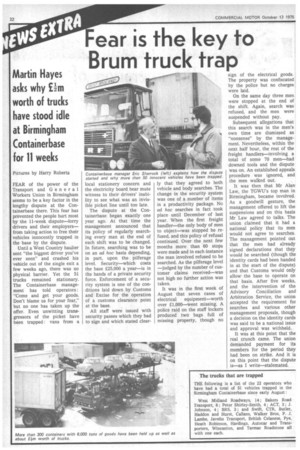ear is the key to Brum truck trap
Page 24

If you've noticed an error in this article please click here to report it so we can fix it.
FEAR of the power of the Transport and General Workers Union in Birmingham seems to be a key factor in the lengthy dispute at the Containerbase there. This fear has prevented the people hurt most by the 11-week dispute—lorry drivers and their employers— from taking action to free their vehicles innocently trapped in the base by the dispute.
Until a West Country haulier sent "the biggest driver you've ever seen" and crashed his vehicle out of the single exit a few weeks ago, there was no physical barrier. Yet the 51 trucks remained stationary. The Containerbase management has told operators : "Come and get your goods. Don't blame us for your fear," but no one has taken up the offer. Even unwitting transgressors of the picket have been trapped: vans from a local stationery concern and the electricity board bear mute witness to their drivers' inability to see what was an invisible picket line until too late.
The dispute at the Containerbase began exactly one year ago. At that time the management announced that its policy of regularly searching every man at the end of each shift was to be changed. In future, searching was to be on an ad hoc basis depending, in part, upon the pilferage level. Security—which costs the base £25,000 a year—is in the hands of a private security force. Enforcement of a security system is one of the conditions laid down by Customs and Excise for the operation of a customs clearance point at the base.
All staff were issued with security passes which they had to sign and which stated clear ly that they agreed to both vehicle and body searches. The change in the security system was one of a number of items in a productivity package. No ad hoc searches in fact took place until December of last year. When the first freight handler—the only body of men to object—was stopped he refused, and this policy of refusal continued. Over the next few months more than 60 stops were made and in each instance the man involved refused to be searched. As the pilferage level —judged by the number of customer claims received—was not high no further action was taken.
It was in the first week of August that seven cases of electrical equipment—worth over £1,000—went missing. A police raid on the staff lockers produced two bags full of missing property, though no sign of the electrical goods. The property was confiscated by the police but no charges were laid.
On the same day three men were stopped at the end of the shift. Again, search was refused, and the men were suspended without pay.
Subsequent allegations that this search was in the men's own time are dismissed as "nonsense" by the management. Nevertheless, within the next half hour, the rest of the freight handlers—involving a total of some 70 men—had downed tools and the dispute was on. An established appeals procedure was ignored, and the men walked out.
It was then that Mr Alan Law, the TGWU's top man in Birmingham, became involved. As a goodwill gesture, the management offered to lift the suspensions and on this basis Mr Law agreed to talks. The union claimed that it had a national policy that its men would not agree to searches. The management pointed out that the men had already signed declarations that they would be searched (though the identity cards had been handed in at the start of the dispute) and that Customs would only allow the base to operate on that basis. After five weeks, and the intervention of the Advisory Conciliation and Arbitration Service, the union accepted the requirement for searches and various other management proposals, though a decision on the identity cards was said to be a national issue and approval was withheld.
It was at this point that the real crunch came. The union demanded payment for its members for the period they had been on strike. And it is on this point that the dispute is—as I write—stalemated.
































































































